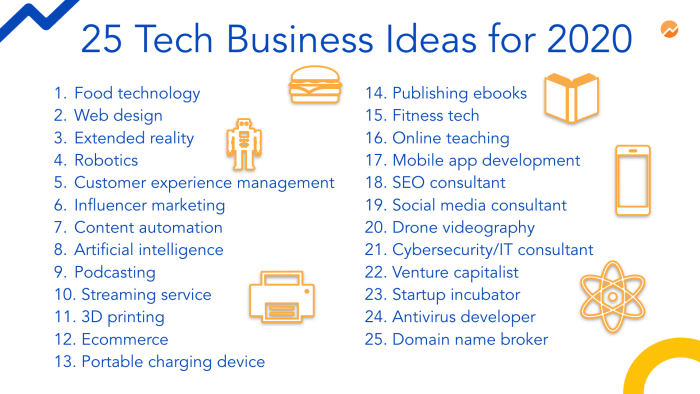Online Business Ideas: Unleashing Your E-Commerce Potential sets the stage for a deep dive into the world of e-commerce, offering a fresh and engaging take on various online business opportunities. Explore the realm of digital entrepreneurship with this hip and informative guide.
Get ready to discover the ins and outs of different online business models, effective monetization strategies, and crucial steps to launch your own successful online venture.
Types of Online Business Ideas

In the fast-paced world of online business, there are a variety of ideas and models that entrepreneurs can explore to create successful ventures. Let’s take a look at some of the different types of online business ideas and models that have proven to be successful in various niches.
E-commerce Business
E-commerce businesses involve selling products or services online. This can range from handmade crafts to digital products like e-books or online courses. Some successful examples include Amazon, Etsy, and Shopify.
Subscription-based Business
Subscription-based businesses offer products or services on a recurring basis, providing customers with convenience and value. Examples include Netflix, Spotify, and Dollar Shave Club.
Affiliate Marketing
Affiliate marketing involves promoting products or services from other companies and earning a commission for each sale made through your referral. Successful examples include Amazon Associates, ClickBank, and Commission Junction.
Dropshipping
Dropshipping is a business model where the seller does not keep products in stock but instead transfers customer orders and shipment details to a third party. The third party then ships the product directly to the customer. Successful examples include Oberlo and AliExpress.
Freelancing and Consulting
Freelancing and consulting businesses offer services such as graphic design, writing, marketing, or coaching on a project basis. Platforms like Upwork, Fiverr, and Clarity.fm have been successful in connecting freelancers with clients.
Digital Marketing Agency
Digital marketing agencies help businesses promote their products or services online through strategies like social media marketing, , and email marketing. Successful examples include Neil Patel Digital, HubSpot, and Social Chain.
Online Education Platforms
Online education platforms provide courses and training programs on various subjects, allowing learners to acquire new skills and knowledge from the comfort of their homes. Successful examples include Coursera, Udemy, and Khan Academy.
Researching Online Business Ideas

When it comes to researching online business ideas, it’s essential to dive deep into the market to understand the landscape and identify potential opportunities. By conducting thorough research, you can better evaluate the feasibility of your business idea and increase your chances of success.
Conducting Market Research, Online Business Ideas
Market research is crucial for identifying trends, customer needs, and potential competitors in the online business world. Here are some key steps to conduct effective market research:
- Utilize online tools like Google Trends, Planner, and social media analytics to identify popular trends and s in your industry.
- Survey potential customers to gather feedback on your business idea and understand their pain points and preferences.
- Analyze your competitors to identify gaps in the market and determine how you can differentiate your business.
Key Factors for Feasibility Evaluation
When evaluating the feasibility of an online business idea, consider the following key factors:
- Market demand: Is there a need for your product or service in the market?
- Competition: Are there already established businesses offering similar products or services?
- Costs and revenue potential: Calculate the initial investment required and potential returns to assess profitability.
Identifying Target Audiences
Identifying your target audience is crucial for tailoring your marketing strategies and product offerings to meet their needs. Consider the following when identifying your target audience:
- Demographics: Understand the age, gender, location, and interests of your target customers.
- Behavioral patterns: Analyze the online behavior and preferences of your target audience to tailor your marketing efforts effectively.
- Pain points: Identify the challenges and problems your target audience faces that your business can solve.
Monetization Strategies for Online Business: Online Business Ideas
In order to make money from an online business, it’s important to explore various monetization strategies that can help generate revenue. There are different ways to monetize an online business, and each method comes with its own set of pros and cons. Let’s delve into some successful monetization strategies used by online businesses.
Advertising
Advertising is one of the most common ways for online businesses to generate revenue. By displaying ads on their website or platform, businesses can earn money based on clicks, views, or conversions. However, the downside is that too many ads can turn off users and negatively impact the user experience.
Subscriptions
Offering subscription-based services or products is another popular monetization strategy. By charging users a recurring fee for access to premium content or features, businesses can create a steady stream of income. The challenge with subscriptions is to continuously provide value to subscribers to retain them.
Affiliate Marketing
Affiliate marketing involves promoting other companies’ products or services and earning a commission for every sale or lead generated through your referral. This can be a lucrative monetization strategy, especially if you have a large audience or niche following. However, it requires building trust with your audience and selecting the right products to promote.
Setting Up an Online Business
Starting an online business involves several important steps to ensure success. From creating a strong online presence to selecting the right tools and platforms, there are key elements to consider when launching your venture.
Choosing a Business Model
- Research different online business models such as e-commerce, subscription services, or digital products.
- Identify your target market and niche to tailor your business model accordingly.
- Consider the scalability and profitability of each model to determine the best fit for your goals.
Selecting Essential Tools and Platforms
- Choose a reliable e-commerce platform like Shopify, WooCommerce, or BigCommerce to set up your online store.
- Utilize website builders like Wix or Squarespace for easy website creation and customization.
- Integrate essential tools such as payment processors, email marketing software, and analytics tools to streamline your operations.
Building a Strong Online Presence
- Develop a professional website with clear branding, high-quality images, and user-friendly navigation.
- Optimize your website for search engines () to improve visibility and attract organic traffic.
- Utilize social media platforms to engage with your audience, share valuable content, and drive traffic to your website.